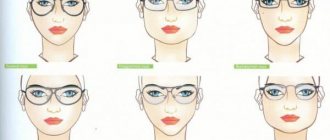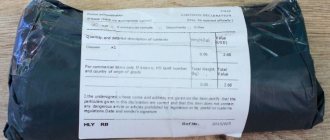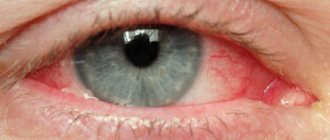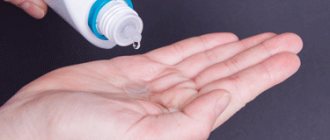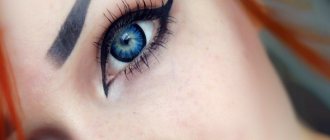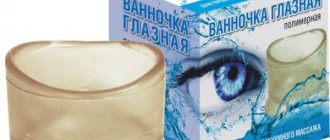Types of glasses in glasses
There are 2 most common types of material from which vision correction glasses are made:
- Glass. The model turns out to be quite thick and heavy. But, despite this, many patients choose this particular material, as it successfully corrects a severe decrease in visual acuity. The model is difficult to scratch and rarely cracks. It can be wiped without fear of cracks appearing if pressed too hard.
- Polymer plastic. The most common type of glasses. They are easy to wear, convenient, comfortable, and low weight. The disadvantage is that the surface of the lenses is more traumatic. They often get scratches, and there is a high risk of cracks forming with minor impacts. When wiping, be careful not to damage or crack the lenses.
The cleaning method will vary depending on the lens material you choose, but all fixtures will remain the same.
Quick removal of contaminants
Today, frames are expensive, and most people buy budget models, which are not made from the highest quality materials. These frames are easily deformed and their coating is not durable. If you frequently wash such glasses, the paint and protective layer will quickly peel off, the metal will begin to turn green, stain the skin, cause itching, irritation and even an eye infection.
We recommend: Learn how to beautifully fold paper napkins on a holiday table using diagrams
For such glasses, it is preferable to clean them with a special spray, which dries quickly, does not require much wetness of the frame and effectively removes dirt. These products are sold in opticians and online stores.
Wet disposable wipes are also suitable for cleaning glass from debris, dust particles and grease. But you need to use not just any, but those intended for the care of optics. Special products and wipes are available for lenses with anti-reflective coating.
Be sure to keep your glasses clean - this is the key to good visibility and healthy eyes and skin. The cheaper the frame or more expensive the lenses, the more careful care is needed. The best option is daily cleaning with a special spray and weekly washing with soap and a microfiber cloth.
How often should you clean your glasses?
If a person wears glasses on a regular basis, it is recommended to wipe them every morning, immediately after sleep. You need to accustom yourself to this, like brushing your teeth. If dirty spots, fingerprints, or dust appear on the surface of the lenses, it is recommended to immediately wipe the glasses. If this is not done, the normal angle of vision is reduced. Eyes become strained when viewing.
If a person uses glasses only for working on a computer, watching movies on TV, or reading books, wipe them before each use. Since glasses can be useful at any time in life, it is important to store them in a special case.
It should contain a small microfiber cloth that needs to be used to clean the surface.
How to dry glasses correctly?
Useful notes and recommendations:
- If the glasses were washed under water, be sure to shake them off, and only then proceed to dry them with a microfiber cloth.
- When working with rags, do not move randomly. Move in one direction.
- Don't use too much force. Movements should be light and circular.
- First, the glass is wiped, then the nose pads, and then the frames and temples themselves.
- The decorative elements of the frame and the fasteners connecting the temples can accumulate moisture and it will not be possible to dry them by simply wiping them with a rag. Therefore, it makes sense to let the glasses sit for a while after washing . If you do this, you will be able to preserve the original consumer properties of your optics longer.
Crochet openwork booties
How to properly place shoes in the hallway
Preventing glasses from getting dirty quickly
To prevent excessively rapid formation of dirt on your glasses, it is recommended to follow several rules:
- Storage in a case, which should additionally contain a microfiber cloth. The case should be slightly larger than the glasses so as not to make it difficult to keep them inside. Otherwise, the model may be damaged.
- Putting on and taking off glasses according to certain rules. It is forbidden to touch the temples, bridge of the nose, or the lenses themselves. This will not only lead to contamination, but will also increase the risk of mechanical damage to the model. When installing and removing glasses, your fingers are placed on the top and bottom of one of the lenses.
- The use of special sprays, the function of which is to prevent stains on glasses when exposed to water, dirt, or fingerprints.
It is important to use these rules daily, then your glasses will be clean for a long time and will be better preserved.
What can't you wipe?
In order not to quickly say goodbye to your favorite accessory or means of improving vision, you need to properly care for it.
How to care for your glasses:
- Never wipe your lenses with the first cloth you come to hand. Use only microfiber, and keep it specifically for glasses. You cannot wipe other objects with it.
- Do not use regular wet wipes. Their fibers are too coarse and can scratch lenses.
- Do not use folk remedies such as ammonia, bleach, vinegar, or glass washing liquid to remove dust.
- Do not use baking soda or other abrasives. Scratches will appear.
To maximize the life of your glasses, follow these rules.
To enjoy wearing glasses and catch the eye of others, always keep an eye on your things and take proper care of them.
Adviсe:
- Always put in a few wet wipes before going out. Buy a set of microfiber cleaning cloths to use in rotation.
- Do not place them with the lenses facing down to avoid scratching them. Use special cases. They will save your glasses if they accidentally fall off.
- Try to keep them away from cosmetics. Use hairspray, deodorant or perfume to remove them.
- Remove with both hands, this will not break them and will maintain the fastening.
- Lenses deteriorate at temperatures above 80 degrees, so try not to leave them in the sun.
Proper care of your glasses means good clarity and contrast. Otherwise you will have to change them very often.
With proper care, you can replace your glasses once every few years if the frames are in good condition. This is a very good saving.
Every ophthalmologist patient who has corrective glasses should know how to properly care for the lenses, since during the day the glasses become covered with dust, dirt and grease, and such contamination significantly impairs vision acuity. In order not to damage the lenses and maintain excellent visibility, you need to choose the right cleaning method. To do this, first find out how to wipe your glasses so that there are no streaks, and how often this needs to be done.
How to clean glasses without streaks
To ensure that there are no streaks left after wiping your glasses, it is recommended to use specialized cleaning products. Each of them can be purchased at an optician.
First, it is recommended to clean the surface of the glasses from dirt. Soapy water, spray or disposable wipes are suitable for this. Next, it is recommended to polish the surface of the glasses using a microfiber cloth. This will eliminate the risk of streaks and fingerprints on the lenses.
Cleaning spray
This is a specialized liquid intended for optics. It has a hypoallergenic composition, so it does not cause allergic reactions. It does not contain substances that could damage or scratch the surface of the lenses. Additionally, they have an antistatic effect, so foreign objects, dust, and hair do not stick to the surface. You can choose a special spray, after using which no water or dirt will remain on the surface of the glasses.
It is not recommended to use various sprays that are intended for other purposes. They contain components that can protect the surface of the glasses from re-penetration of dirt and stains.
This spray is small in size, so you can always carry it with you and use it as needed.
Microfiber cloths
This device has a very soft structure and absorbs drops of water or fogging well. It eliminates stains, and even minimal scratches do not form on the surface of the glasses during polishing. You can buy the smallest microfiber cloth that will fit in your glasses case. There it will not become covered with dust, so it will be more effective.
If the microfiber cloth itself becomes dirty, it must be washed thoroughly with soap. This can be done by hand if it is very small in size. It is recommended to use soapy water for this.
Disposable wipes
Their structure is also very soft; they are thoroughly impregnated with a dilute alcohol solution. Therefore, after wiping, they not only remove dirt and grease from the surface, but also contribute to the antibacterial effect.
It is important to remember that this napkin can only be used once. After that, she is thrown out. During repeated use, it will be completely dried out, so it will not be able to remove dirt from the glass.
Warm soapy water
To obtain a soap base, you can use any cleaning agent that will not cause an allergic reaction in humans. Lightly wipe the surface with soapy water, after which dirt and fogging are thoroughly removed. Next, wipe with a microfiber cloth.
What cleaning methods can be used?
Wet and dry cleaning methods using water, specialized and household cleaning products are acceptable. When choosing an option, consider the type of frame and lenses, their condition and recommendations from the manufacturer, which can be found in the booklet or instructions for the glasses.
Napkins and cloths
Specialized napkins are disposable and reusable. The latter, as a rule, are made from microfiber, which effectively and carefully removes dirt and does not leave behind streaks. Traces remain only if a dirty cloth is used . To return it to cleanliness, just use a weak soap solution or regular soap. It is not recommended to machine wash with other items.
Important! Reusable cloths do not require liquid products, but can be supplemented with them. The treatment procedure itself is reduced to mechanical wiping with or without preliminary spraying. Combined use will require washing the cloth (provided that the lenses were seriously dirty or the cloth had already been used for cleaning several times before).
Disposable napkins cannot be washed; they lose their integrity due to such a procedure. But they are often impregnated with special additives that help achieve the best results with minimal effort . Their use is limited to wiping the surface. There is no need to dry your glasses after this.
In addition to specialized napkins and rags, you can also use ordinary soft rags. It is advisable that they be new and not previously used for cleaning other items. The priority is soft and natural fibers, colorless and highly absorbent. The latter quality must be clearly expressed, otherwise streaks may appear.
It’s still not worth using ordinary rags to dry it . This method can be resorted to only in case of urgent need and complete lack of time. It would be much more correct to hold the frame for about a minute under warm water, and only then start working with a rag. At the end of the procedure, place the glasses on another dry cloth . This will allow small fasteners and hard-to-reach places to dry properly.
Important! Water is completely replaceable with specialized cleaning compounds.
Compositions and means
Specialized sprays and liquids are characterized by careful treatment of optical devices. At the same time, they remove all typical contaminants from glass, both organic and inorganic. And their contact with the plastic frame does not lead to the formation of a film. Most of them, in addition to their main function, also cope with a number of optional ones. For example, they act as an antiseptic or antistatic.
Some of them additionally prevent fogging . The topic raised is a pressing problem that arises when there is a sharp change in temperature (in other words, when entering a room from a winter street). Its peculiarity is that such sediment cannot be completely removed by wiping. You have to wait until the frozen glasses can adapt to the room temperature. Treated glass is much less susceptible to fogging . Even if this happens to them, the resulting sediment is easily removed from the surface of the lenses.
Important! When choosing a composition, pay attention to what type of lenses it is compatible with. In addition to universal products that are equally suitable for sunglasses and corrective glasses with any type of lenses, there are also highly specialized products. It is designed for use with a specific type of optical devices and only in combination with them shows decent results.
Recommended sprays and products:
- Good Look. A universal spray that improves light transmission and prevents fogging.
- HD. Solution for glass lenses. It is noteworthy that it can process not only glass, but also all types of frames.
- Spray Clean. A universal option, suitable also for anti-glare glasses.
Prohibited eyeglass care products
To wipe dirt off glasses, it is not recommended to use the following devices:
- pure alcohol, vodka;
- detergent for floors, bathrooms, sinks, toilets;
- coarse fiber, towels, tablecloths, hand wipes, clothing, toilet paper;
- perfume, air freshener;
- ordinary running water.
If you use rough cloths to wipe your glasses, they will quickly damage it, causing a lot of scratches on the surface, so the glasses will be unusable. If you use products not intended for glasses, a person may experience an allergic reaction. When using regular running water, dirt and liquid particles will not be completely washed off from the surface, and streaks will remain.
How to clean the frame from dirt?
It is recommended to combine the procedure with cleaning the lenses using detergents . In this case, the glasses are wiped first and only after that a soap solution or foam is applied to the temples and the front frame of the glasses.
For the convenience of the procedure and a better result, use cotton swabs . Sprinkle a small amount of detergent on them and then wipe down any areas that need cleaning. If you don’t have chopsticks on hand, you can use a toothbrush with the softest bristles as a replacement.
Important! When using a toothbrush, be careful not to let it come into contact with the surface of the glass. This will definitely lead to scratches and microcracks.
For very persistent and severe stains, you should try using toothpaste. At the same time, you need to be realistic and understand that sometimes marks on plastic that are mistaken for dirt are nothing more than the first signs of its delamination, and the metal frame may well oxidize and begin to rust . In both cases, cleaning is not a recommended action. You need to go to the optician and order a new pair.
Is it possible to wash glasses with soap?
Using soap to clean glasses is one of the methods. This product only washes away dirt particles from the surface, but in the future you will need to use a specialized microfiber cloth to polish the surface.
It is important that all soap particles are washed off the glasses. If they get into a person’s eyes, acute pain, increased lacrimation, and irritation of the superficial structures of the eyes will occur.
Daily cleaning of glasses is a mandatory component of wearing optical aids. It is necessary to perform these actions according to the rules in order to be able to wear glasses for a long time. If plastic glasses were chosen, dirt and scratches often form on their surface, so they need to be washed more often. It is important to remember that their structure is thin and therefore easily damaged.
Folk and professional remedies for eliminating cloudiness
To eliminate the effect of cloudy glasses, the following will help:
available means: washing with soap or dishwashing detergent. They also use toothpaste (without abrasive components), baking soda, homemade solutions (for example, mixing water, dishwashing detergent, isopropyl alcohol);- specialized: in optical salons, professional care products from domestic and foreign manufacturers are widely presented (in the form of sprays, liquids, pencils, brushes, pears, gloves, wet and dry wipes) in sets and individually, for example: “Optics”, “Snowter”, "HG", "Parity", "Uvex", "Honeywell";
- contact optical salons: their specialists, using unique high-tech equipment, carry out the procedure for effective ultrasonic cleaning of any optics. 15 minutes and the glasses will take on their original appearance!
There are digital ultrasound devices available for sale that can be used at home.
Important! Before using ultrasonic cleaning technology yourself, carefully study the range of capabilities of a particular device. If you decide to use the services of professionals, also ask about the limitations of the method.
